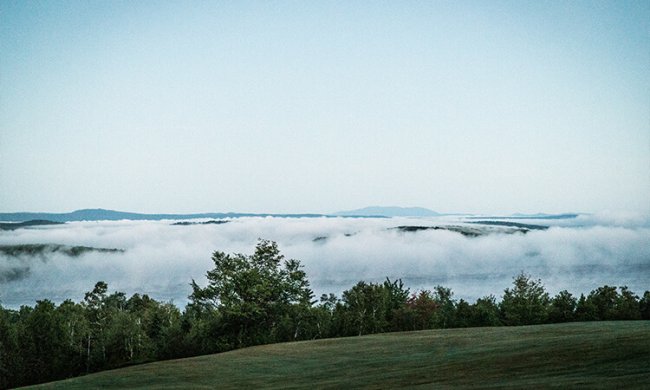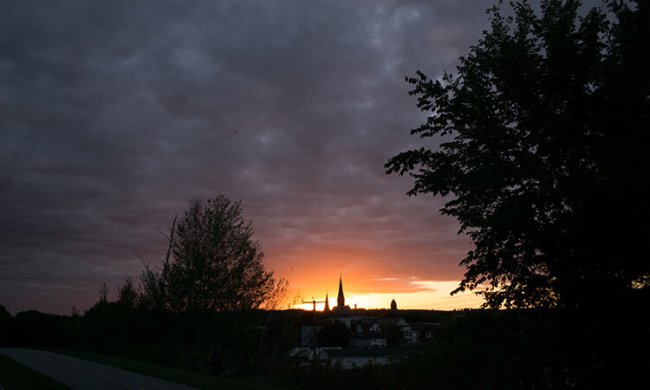Maine filmmaker, Derek Kimball
Two things about Mainers: they’re hard workers and original thinkers. Sometimes the task at hand requires a full day. Other times a full week. In the case of Maine native, Derek Kimball, it required more than three years. Given that his task was directing his first feature-length film – from a screenplay he co- wrote – originality and hard work were as necessary to the production as that big light known as the sun. When the sun finally set on the last day of production, it gave rise to Neptune – a movie about a girl named Hannah, an orphan who grew up in a church on an island off the coast of Maine. One reviewer applauded the “subtle beauty” of the film’s emotional journey and the way “the cool color palette reflects the setting…and contributes a haunting sense of unease to the drama.” In Maine, subtle – and sometimes haunting – stories go with the territory. Recently, the Maine Thing Quarterly had a chance to visit with Derek Kimball as he shared his take on filmmaking and storytelling in Maine.
MTQ – Screenplays traditionally start with the words FADE IN. In the Derek Kimball story, what happens after that?
Derek – I was born and raised in Maine and I started dabbling in film stuff when I was pretty young. I was lucky I had resources where I went to high school in Gorham and was able to use those to work on some films. When you’re younger, you take where you’re from for granted. Or the extreme is that you can’t wait to get out. Which was never really the case for me. But there’s always the presumption that if you want to work as a filmmaker, you have to do it in one of the larger hubs. And that was certainly true when I was younger. So I followed work out west and then kind of followed it wherever it would take me. I was working out west for a while as an editor. And then I was teaching for about ten years at a college level in New York and Boston. It was there that I started to feel the parts of myself that were formed by Maine. It’s a different place. I think people notice it when they’re from other places and they come here. So when I was away teaching, it was always on my mind that I wanted to get back here and shoot a feature and speak to the way that I felt about the state.


MTQ – Let’s talk about what makes Maine an intriguing setting for movies.
Derek – Maine is in a lot of films, and a lot of films are set in Maine. I think that a lot of people who have been here – certainly a lot of people who live here – recognize that there is a certain amount of spookiness that comes from the ratio of wildness to development. I think there is something to the fact that more than half the state is wooded and it’s abutted by this sort of really insane coastline. So there’s an extremity to the elements here that I think people really respond to. And certainly that’s a big part of it for me. So I wanted that to be sort of the highlight. That doesn’t mean ‘include more scenery.’ It means talk about the way those elemental components shape people’s lives and the way that they interact with other people.
MTQ – You mentioned Maine’s unique physical environment. How does that play a role in stirring up creativity and shaping ideas?
I think that anything you can do as an artist to immerse yourself in a space that’s inspiring goes a long way to getting you back to the original impulse of the idea. So for me that was big. Maine has a lot of really picturesque things. There’s the coast and the woods, and there’s a lot of history here. I think there’s a reason why so many famous painters came and painted here. And a lot of them ended up staying.
Winslow Homer kept a studio here in Prouts Neck. The Wyeth family was from Pennsylvania, but stayed up here a lot because their whole family was smitten with it.
MTQ – Tells us about the Maine filmmaking scene. From a creative perspective, but also from the production side.
Derek – There’s a really creative and vibrant community of people working in the industry in Maine. And I can’t say enough good stuff about that. I mean Neptune was 100% Maine-made. Every actor and every crew person – with the exception of the producer’s team and my co-writer, Matt. Everybody who actually had boots on the ground here were Maine folks. And I think that the work they do from a production standpoint can stand up to any market in the country. But the other thing is that your money goes a lot further here. A lot of the sort of headaches that come with shooting on location don’t really apply here.
Like I shot all up and down the coast on a variety of private properties and state parks. And it was always just the easiest thing to get in and out of these really stunning, beautiful places. There are ports, there’s a huge variety of rural diversity. If you’re in Portland, it’s 20 minutes to the lake, 20 minutes to the ocean, 20 minutes to the river, 20 minutes to the mountains. You can get to a variety of places easier, access is much easier.
MTQ – You mentioned earlier about painters coming to Maine. One of the things artists talk about is the light in Maine – the high-contrast northern light. If great painters are attracted, it makes sense that filmmakers are too.
Derek – You hear about the quality of light in Maine and it being unique and I think that’s definitely true. At least from all the other places I’ve been. For instance, we went to Colorado a couple months ago to do some shooting and we were in Durango. It’s such an epic landscape. And everything about that environment should have been easy to capture. But the light was so flat that it was hard to get anything that was exciting. But in Maine it’s kind of like set up a tripod, stick it any direction and you’re bound to hit something interesting.
 ;
;
© 2024 Maine Office of Tourism